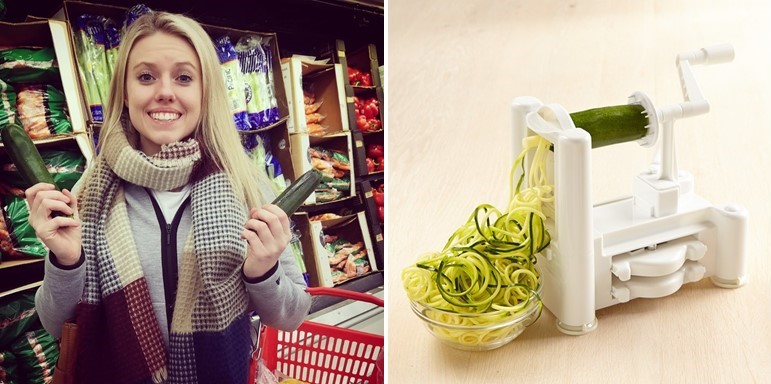Congratulations on finishing 2 whole weeks of eliminating sugar from your diet! Next up: Grains. Think: breads, pastas, crackers, cereal, etc. This might sound like an odd category to focus on, but please, READ ON!

You know when you eat a brownie, a cookie, some ice cream, that you are ingesting sugar. But, besides beverages {which we took care of last week} grain-y products, like bread, cereal, pasta, and crackers are among the highest sources for added sugar! Go ahead, grab that loaf of bread, package of spaghetti or box of cereal. Check out the ingredient label. See any sugars, syrups or anything ending in –ose? Mmmmm hmmm, that’s what we thought. Get that stuff outta here!
So what about grain-y foods without added sugar? Are those ok, just actual grains? Can we eat them? Should we eat them? If so, how much? Or should we avoid them altogether?
Grains have actually created a lot of controversy in the nutrition world recently. Depending on who you ask, you’ll likely get very different answers to the above questions…and we think that’s ok! What we can share is some of the basic science and general information, and let you decide if consuming grains {only sources without added sugar} is good for YOUR body. We would encourage you to try NOT consuming them for a couple of weeks and see how your body responds.
The basic science…grains are a carbohydrate. When we consume carbs, they turn to glucose (sugar) in our bodies. Glucose is then used as energy, or stored as fat. We need some glucose, some carbohydrates, for basic bodily functions. Too many carbs, though, or carbs not efficiently processed by our bodies, get stored as fat. And we all know it’s pretty easy to overconsume grains!
Aside from being a carb, grains do have some nutritional value, however the amount of nutrients and whether our bodies can access those nutrients is pretty variable. Plus, grains can cause other health problems too. There are different types of grains you should be paying attention to! Whole grains, refined grains, and enriched/fortified grains. Some nutritionally better than others. Grains are NATURALLY made up of a bran (fibrous protective layer), endosperm (concentrated carb source), and the germ (tiny reproductive kernel).
REGARDLESS of the nutritional value, a grain is still a carb which is still converted to sugar in our bodies.
You’re probably wondering “so what’s so bad about whole grains?” When you see the word “Whole Grain” on a product label, that does NOT mean that the product is made up of 100% whole grains.
The U.S. Government doesn’t have strict rules on labeling grains on food products. A food product can be labeled as ‘Whole Grain’ as long as it has 8 grams of whole grain per serving, even if the product contains more refined grains than whole grains. Don’t let the words “whole grain” fool you!
Besides the government regulation factor, compared to other whole foods like fruits and veggies, whole grains are actually nutrient poor. They contain a compound called phytic acid, or phytate (“anti-nutrient”) which is found mainly in the bran of the seed. This compound grabs ahold of the minerals present in the seed and makes them insoluble and indigestible. This prevents these key nutrients from being absorbed into the body. Meaning, we are not benefiting from eating most grains.
Grains also contain many different protein structures. These proteins often are problematic to our gut, causing inflammation. One of these problematic proteins is called prolamins. We all have heard of gluten! Gluten, a protein found in wheat, rye, and barley, contains prolamins. The structure of a prolamin makes it difficult or even impossible for our digestive enzymes to break down into amino acids. In turn, this can cause systemic inflammation which can show up ANYWHERE in the body as ANYTHING (allergies, arthritis, asthma, celiac, Chrones, fatigue, fibromyalgia, psoriasis, etc.)
Why we should limit or even completely ditch grains:
Bottom Line: Grains with added sugars are off limits. Refined/enriched grains are the poorer quality products and should be avoided due to how they react in our bodies.
Since bodies can react differently, we are leaving it up to you to ditch grains for good or keep them in your diet. BUT let’s try eliminating them for a few weeks to see if you feel a difference – better, worse, or the same!

Do you LOVE pasta? Try replacing it with zoodles (zucchini noodles) or spaghetti sqush! You may learn it isn’t the taste you love, but the texture when combined with a red sauce and meat (like spaghetti and meatballs). Plus, by choosing one of these vegetables, you’re still getting the carbohydrates your body needs, as well as some additional vitamins and minerals!
If you have a great recipe, please share on Instagram or Facebook, tagging @Farmgirlfit and #FGFSweetEnough
http://www.farmgirlfit.com/shop/
